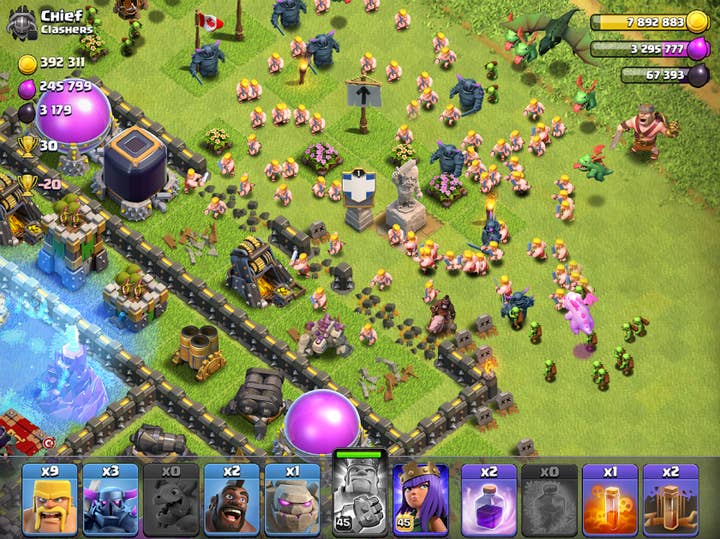Demystifying venture capital
VCs want companies thinking several years ahead, says London Venture Partners' Are Mack Growen, and are prepared for some failure on the road to success
Access to finance is cropping up again and again as one the biggest challenges facing game developers in 2018.
With costs rising and the marketplace growing increasingly crowded, it's harder than ever to cut through the noise. Securing venture capital funding might sound daunting - and it's certainly not easy to get hold of - but if your company fits the bill it could be the key to success.
There is a lot to keep in mind when seeking investment, however, and it's more than just the money. Are you forging a partnership that works for both parties? What assistance is the VC offering other than just cash? And what are they asking of you in return?

In order to demystify the world of VC funding, GamesIndustry.biz caught up with London Venture Partners (LVP) vice president of product Are Mack Growen ahead of his talk at the Nordic Game Conference this week. He shed some light on what investors are looking for and, perhaps more importantly, what they avoid.
Established in 2010 by industry heavyweights Phil Harrison, David Gardner, David Lau-kee and Paul Heydon, LVP is entirely focused on games, providing investment into disruptive new technologies in the online, social, mobile and web gaming space. LVP isn't a bank, Growen explains, but industry veterans who are looking to work across many companies and share their experience to help foster growth. While Growen himself has only been with the firm for around 18 months, he has founded and/or managed nine studios across Europe, Asia, and America.
The firm's first ever investment was a little-known Finnish developer working on browser games. That company was Supercell, which has seen an 800 per cent revenue increase since 2012, and is now valued at around $10 billion. More recent investments include Bossa Studios, Beta Dwarf, and Radiant Entertainment.
“We're not the game designer, we're not talking to their community every day; they have to own it, it's their vision”
"I think no one in their right mind would expect something to become as big as Supercell, but they expected it could go far," says Growen. "At the time the team was operating Gunshine on Facebook, but this was a team of experienced guys and they were very driven and very clear on what they wanted to achieve and the quality of products.
"They had their pillars and their philosophy all mapped out and they were very driven towards highly successful games that were engaging large amounts of audience. So you look for teams that have that type of ambition and want to really achieve something."
That was what first attracted LVP to Supercell, and it's what they look for when scoping out potential investments. One of the problems VCs frequently come across are companies that don't quite understand the world they're trying to enter, and what exactly is expected of a company looking for investment.
"Founders have to be really clear about what they are building," says Growen. "Are you building a VC backed business, or a lifestyle business? There's nothing wrong with building a lifestyle business. It's just that it's not suitable for VC funding."
Lifestyle businesses are, as Growen explains, smaller endeavours with no intention of becoming the next Supercell, but rather staying relatively small, making games with the same team, and filling a niche in the market.
"We take this money from investors and say we can identify fast growing companies in the gaming space that will become worth a lot of money because they will execute excellently on great opportunities at great speed and become number one or number two in these genres," he says.
“When [a VC] first meets the company, one of the things you're trying to see is the chemistry. Is it a good and healthy relationship? You're looking for a balance”
"That's one of the things we really have to look for: an understanding and an appetite to really build that type of business, because you have to [work faster] and you have to take bigger and riskier bets."
With so many developers struggling to access funding, LVP gets multiple pitches every day. The firm only considers investing in around six companies per year, however, so your pitch has be exactly what they are looking for. Unfortunately for developers looking to make the next indie darling, VC funding isn't an appropriate avenue.
"We are looking for the team and vision, and the longer term; what are these guys trying to build?," says Growen. "Typically the first game will fail - that's fairly common - and typically the second game will also not do very well. The team will need multiple attempts to be successful, so if the plan is only the design for a game there is big problem when the first game fails.
"It could lead to an existential crisis where you are scrambling and wondering what you're going to do next... What we like to see is someone who is looking beyond the game, someone who is looking two or three years down the road."

Developers that have identified an opportunity - whether that's a gap in the market or a new application of some emergent tech - are in with a better shot than the developer with a game idea, no matter how refined that idea might be. You need to sell VCs on your strategy, the users and community, and how you're working with current trends.
As Growen explains, VCs are looking to invest big money for a big return, but they are also want to grow small companies into giant ones. Ultimately, they are looking to repeat the success of Supercell, and if you want their investment you have to show them what you're capable of.
"You have to operate the game as service; there is no way around it," says Growen. "Even the die-hard premium developers on PC are realising that you do need to service the game, you do need update, talk to the community, run events and so on. Unless you do, the community is not going to rally behind your game. You have no choice. The user base expects to get involved."
“You don't want to give away large chunks of your business to someone without any industry knowledge for very small amounts of money”
When considering seed funding pitches, there are a few important things Growen looks out for. VCs want developers that are assertive and uncompromising on their vision, but also open to listening and taking advice. One without the other is a disaster brewing.
"When [a VC] first meets the company one of the things you're trying to see is the chemistry," says Growen. "Is it a good and healthy relationship? You're looking for a balance.
"A word that's often used is 'coachable'. It sounds potentially a bit [condescending], but it's not meant in that fashion. You're trying to find founders where you hit the sweet spot. You don't want them to be taking every suggestion and every poke and prod you have... and change their pitch, because we're not the game designer. We're not talking to their community every day. They have to own it, it's their vision.
"You would not invest in a team that is too keen to take everything you say onboard. But you're also not keen to invest where there is no possibility for a fruitful discussion, where they have a set mind and they're never going to listen to anyone else."
There are a number of other red flags that could turn a VC away from your company. The capitalisation table is one of the less obvious ones, but you need to make sure everything is order.
“As far as you can, you want to select investors that you really want to work with, so guys who understand the market you're in”
"You typically want to keep it logical," says Growen. "You don't want to give away large chunks of your business to someone without any industry knowledge for very small amounts of money."
Another potential mark against your company might be how well you understand your own needs. A few gaps in the team aren't a problem, for example, but only as long as you're aware of the issues and are seeking to address them as soon as the money is available.
"Do you cover the necessary areas for what you're trying to achieve?" says Growen. "And if you don't, do you recognise it? It's fine not to have all the members as long as you know, but it's more problematic when you don't recognise it."
It's important to remember that the relationship between a VC and a developer isn't one-sided, however, and you need to make sure that you're taking investment from the right the people. The money might be tempting, but if you're in a bad partnership it could prove more trouble than it's worth.
"As far as you can, you want to select investors that you really want to work with, so people who understand the market you're in," Growen stresses. "It's not uncommon to have a lot of people who invest in your business who really do not understand what you're doing, and will ask the same type of questions again, and again, and again.
"It's difficult for an entrepreneur to get much assistance from that. As far as you can, you want to select investors that understand the gaming space. And you want to select investors you really get along with, because you're going to be spending a lot of time together.
"You need to be able to have trust and honest feedback. The more honest a relationship is, the more value you can get out of it. It's much easier for us to know how to help if the founder reaches out and is honest."
From the tech to the talent, there are opportunities for games businesses to become multi-billion dollar companies. VCs are looking for companies that will reshape the industry. Proving that yours has the potential to do that is challenging, but ultimately you're not competing with companies like Supercell; you're competing with other startups for the same few pools of funding. VCs understand this, and they want to invest in companies that are working to disrupt the industry in a way that larger, more established developers are less capable of.
"That's the whole advantage with a startup; it's lean and fast moving," says Growen. "You don't have a big organisation and set ways of doing things and set processes. You don't have the 'good old way that always works' and so on. You have to look at opportunities like AI, or the competition that's coming now with distribution chains, and the tools like Improbable... We look for teams that use those opportunities in the market with a grand understanding of a certain community and user base, and a big plan to boldly and ambitiously go after it."
GamesIndustry.biz is a media partner of the Nordic Game Conference. We will attend the show with assistance from the organiser.
